Introduction
Physical activity is a cornerstone of a healthy lifestyle, offering a myriad of benefits for both the body and mind. Despite facing disabilities, weight challenges, chronic conditions, or the natural concerns that come with aging, individuals can still unlock the physical, mental, and emotional benefits of exercise. The misconception that effective exercise is beyond reach is dispelled by the understanding that any form of exercise, regardless of intensity or type, contributes to overall well-being.
Exercise, irrespective of its form, triggers the release of endorphins—natural mood enhancers that foster a sense of well-being, reduce stress, and improve self-esteem. All of the following cardio and strength exercises as well as the stretches can be done in the comfort of your home. Adding a few minutes of exercise per day or per week will build a routine that fits you. Let’s delve into the numerous advantages of these adaptive exercises across different domains:
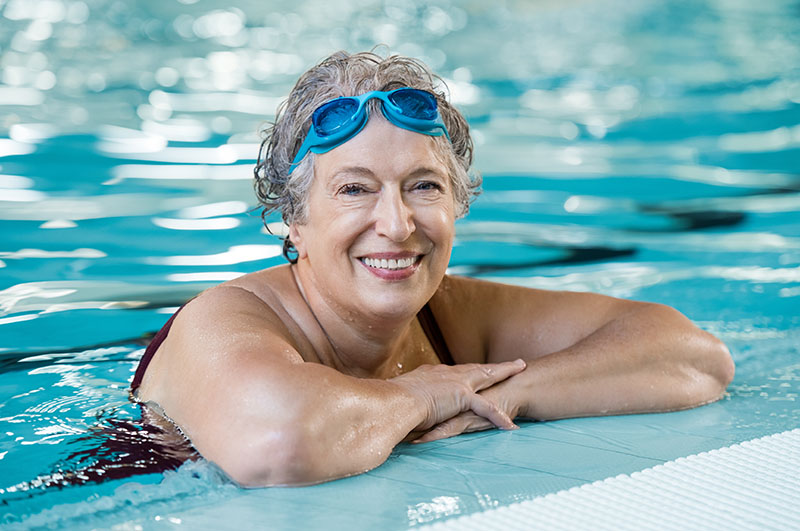 Cardiovascular Exercises
Cardiovascular Exercises
Cardiovascular exercises are essential for heart health, improved circulation, and overall well-being. Here are some inclusive options:
Seated Marching:
- Sit in a sturdy chair with your feet flat on the floor.
- Lift one knee at a time, simulating a marching motion.
- Increase the pace to elevate your heart rate.
Benefits: Elevates heart rate, promoting cardiovascular fitness, while it improves circulation and enhances blood flow to various parts of the body.
Arm Ergometer:
- Use a hand cycle or arm ergometer to engage your upper body.
- Rotate the handles in a cycling motion to boost cardiovascular fitness.
- Start with a comfortable pace and gradually increase intensity.
Benefits: Promotes upper body endurance and strengthens and builds endurance in the arms, as well as burning calories to support weight management and overall metabolic health.
Swimming or Water Aerobics:
Benefits: The buoyancy of water reduces impact on joints. Swimming is a whole-body workout, engaging multiple muscle groups simultaneously.
Strength Exercises
Building and maintaining muscle strength is vital for mobility and functional independence. Consider these strength exercises:
Upper Body
Seated Shoulder Press:
- Sit with your back straight and hold light dumbbells in each hand.
- Lift the weights overhead, extending your arms fully.
Benefits: Strengthens the deltoid muscles, promoting shoulder stability and reinforces the upper back, aiding in better posture.
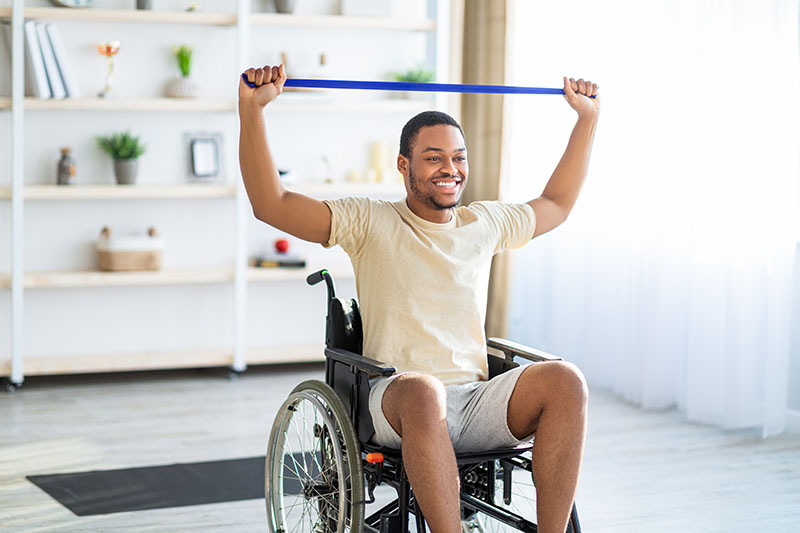 Resistance Band Pull-Aparts:
Resistance Band Pull-Aparts:
- Hold a resistance band in front of you with both hands.
- Pull the band apart, engaging your shoulder blades.
Benefits: Enhances flexibility and range of motion in the shoulders, and supports a strong, stable upper back for improved posture.
Seated Bicep Curls:
- Sit with good posture, holding dumbbells in each hand.
- Curl the weights toward your shoulders, engaging your biceps.
Benefits: Enhances the functional arm strength needed for daily activities, and supports elbow joint stability.
Lower Body
Seated Leg Press:
- Use a resistance band or leg press machine while seated.
- Push your legs forward against resistance, targeting your quadriceps.
Benefits: Builds strength in the quadriceps muscles and improves the ability to rise from a seated position.
Wall Sits:
- Stand with your back against a wall and lower into a seated position.
- Hold the position for as long as comfortable, engaging your thigh muscles.
Benefits: Builds endurance in the quadriceps, hamstrings, and glutes, which promotes flexibility in the hips and knees.
Ankle Circles:
- While seated, lift one foot off the ground and make circular motions with your ankle.
- Switch directions after a few repetitions.
Benefits: Improves flexibility and circulation in the ankles and alleviates stiffness often associated with limited mobility.
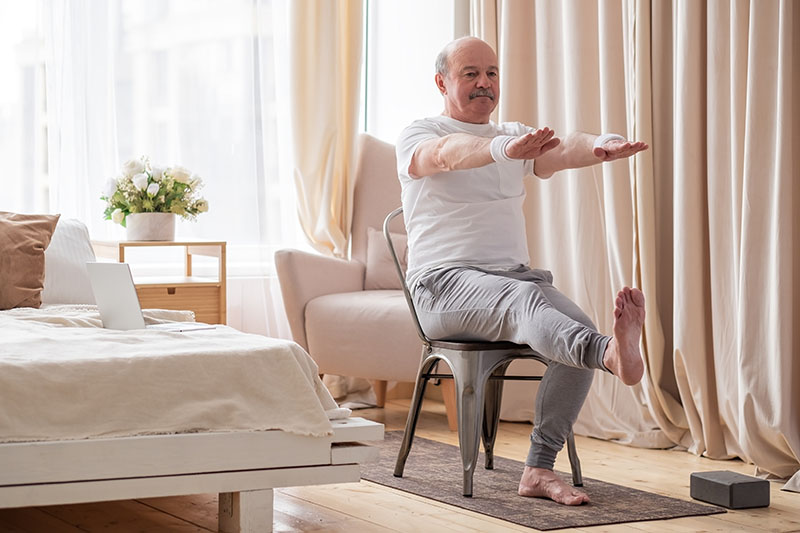 Flexibility Exercises
Flexibility Exercises
Improving flexibility enhances joint mobility and reduces the risk of injury. Incorporate these exercises into your routine:
Seated Forward Bend:
- Sit with legs extended and lean forward from your hips, reaching towards your toes.
- Stretch as far as comfortable, feeling a gentle pull in your hamstrings.
Benefits: Increases flexibility in the back of the thighs and enhances flexibility in the lower back.
Chair Yoga:
- Explore seated yoga poses, such as twists or gentle stretches.
- Many yoga routines can be adapted for those with limited mobility.
Benefits: Promotes relaxation and stress reduction and enhances overall joint flexibility and range of motion.
Neck and Shoulder Stretches:
- Gently tilt your head from side to side and roll your shoulders backward.
- These movements can alleviate tension and improve range of motion.
Benefits: Alleviates tension in the neck and shoulders and supports better posture by addressing upper body tightness.
Chair Exercises
Seated Marching in Place:
- Lift your knees in a marching motion while seated.
- This helps increase heart rate and works the abdominal muscles.
Benefits: Strengthens and tones abdominal muscles while elevating heart rate.
Seated Side Leg Lifts:
- Lift one leg at a time to the side while keeping your back straight.
- This exercise targets the outer thighs.
Benefits: Targets and strengthens the muscles on the sides of the thighs and enhances flexibility in the hip joints.
Seated Torso Twists:
- Hold the sides of your chair and twist your torso to the right, then to the left.
- This movement engages the core and improves flexibility.
Benefits: Engages and strengthens the muscles around the spine and improves rotational flexibility in the torso.
Core Stability Exercises
For individuals who require seated workouts, these chair exercises provide a fantastic way to stay active:
Seated Core Twists:
- Sit with your back straight and gently twist your torso from side to side.
- Engage your abdominal muscles throughout the movement.
Benefits: Targets and tones the muscles on the sides of the abdomen. Gentle twisting motions can aid in digestive function.
Pelvic Tilts:
- While seated, tilt your pelvis forward and backward.
- This exercise targets the muscles of the lower back and abdomen.
Benefits: Strengthens the muscles around the lower back, and reinforces a neutral pelvic position for better posture.
Seated Knee Lifts:
- Lift your knees towards your chest while sitting.
- Engage your abdominal muscles to support the movement.
Benefits: Activates and tones the abdominal muscles and improves the ability to lift the knees for daily activities.
The Benefits of a Buddy
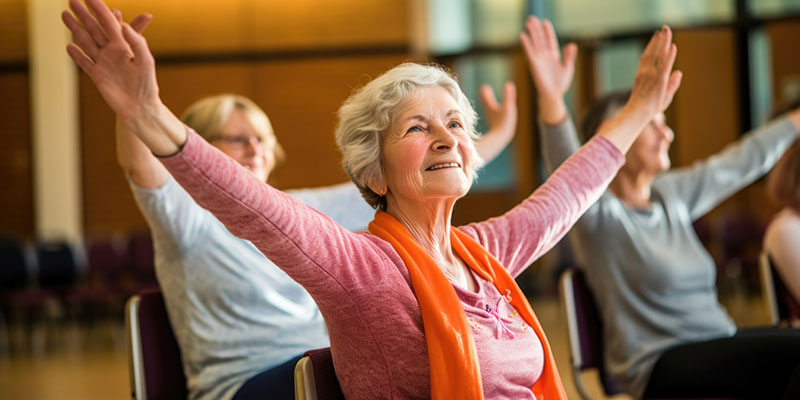 Building a support system can significantly enhance your fitness journey. Invite a friend to join you, particularly when attempting a new activity. Having a companion can make the experience more enjoyable and motivational. If, at times, you fall short of your physical activity goals, remember not to be discouraged. Each day is a new opportunity to try again, and consistency is key. Tailor your physical activities according to your abilities, and always bear in mind that any amount of physical activity, no matter how small, is superior to none. By finding support and sticking with your fitness endeavors, you pave the way for a healthier and more fulfilling lifestyle.
Building a support system can significantly enhance your fitness journey. Invite a friend to join you, particularly when attempting a new activity. Having a companion can make the experience more enjoyable and motivational. If, at times, you fall short of your physical activity goals, remember not to be discouraged. Each day is a new opportunity to try again, and consistency is key. Tailor your physical activities according to your abilities, and always bear in mind that any amount of physical activity, no matter how small, is superior to none. By finding support and sticking with your fitness endeavors, you pave the way for a healthier and more fulfilling lifestyle.
Conclusion
Exercise is a universal right, and everyone, regardless of their physical abilities, deserves the opportunity to enjoy its benefits. By incorporating adaptive and inclusive exercises into daily routines, individuals with disabilities or limited mobility can enhance their cardiovascular health, build strength, improve flexibility, and boost core stability. Remember to consult with a healthcare professional or fitness expert before starting a new exercise program, ensuring that activities align with individual capabilities and health conditions. With commitment and creativity, we can create a more inclusive fitness landscape that embraces and celebrates diversity in all its forms.

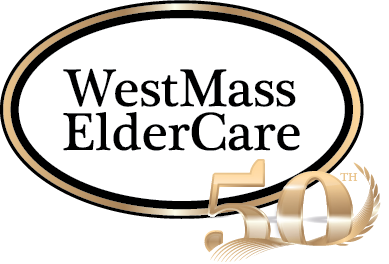
 Cardiovascular Exercises
Cardiovascular Exercises Resistance Band Pull-Aparts:
Resistance Band Pull-Aparts: Flexibility Exercises
Flexibility Exercises Building a support system can significantly enhance your fitness journey. Invite a friend to join you, particularly when attempting a new activity. Having a companion can make the experience more enjoyable and motivational. If, at times, you fall short of your physical activity goals, remember not to be discouraged. Each day is a new opportunity to try again, and consistency is key. Tailor your physical activities according to your abilities, and always bear in mind that any amount of physical activity, no matter how small, is superior to none. By finding support and sticking with your fitness endeavors, you pave the way for a healthier and more fulfilling lifestyle.
Building a support system can significantly enhance your fitness journey. Invite a friend to join you, particularly when attempting a new activity. Having a companion can make the experience more enjoyable and motivational. If, at times, you fall short of your physical activity goals, remember not to be discouraged. Each day is a new opportunity to try again, and consistency is key. Tailor your physical activities according to your abilities, and always bear in mind that any amount of physical activity, no matter how small, is superior to none. By finding support and sticking with your fitness endeavors, you pave the way for a healthier and more fulfilling lifestyle.